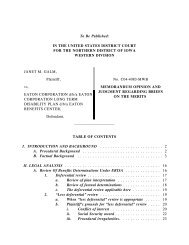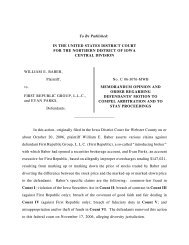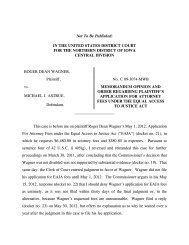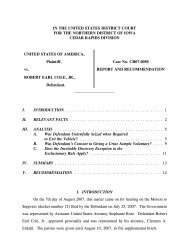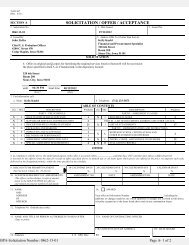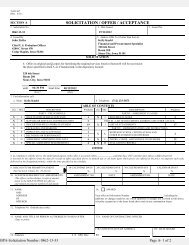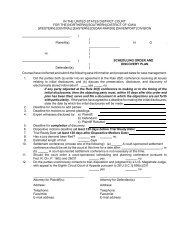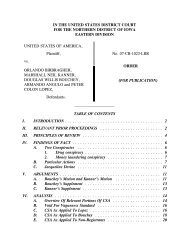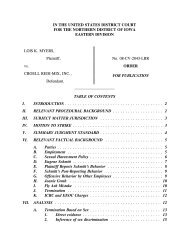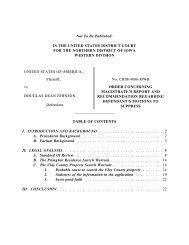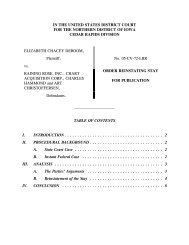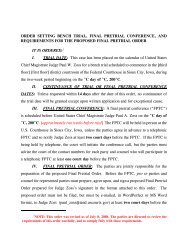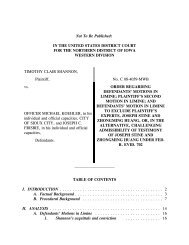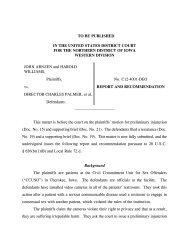C:\Documents and Settings\sey\Desktop\JSS OPINIONS\JSS-05-CV ...
C:\Documents and Settings\sey\Desktop\JSS OPINIONS\JSS-05-CV ...
C:\Documents and Settings\sey\Desktop\JSS OPINIONS\JSS-05-CV ...
Create successful ePaper yourself
Turn your PDF publications into a flip-book with our unique Google optimized e-Paper software.
dismissed. On April 16, 2007, Plaintiff filed a Reply <strong>and</strong> Resistance. On April 26, 2007,<br />
Defendant filed a Reply.<br />
III. LEGAL STANDARD FOR SUMMARY JUDGMENT<br />
Summary judgment is appropriate if the record shows that “there is no genuine issue<br />
as to any material fact <strong>and</strong> that the moving party is entitled to a judgment as a matter of<br />
law.” FED. R. CIV. P. 56(c). “An issue of fact is genuine when ‘a reasonable jury could<br />
return a verdict for the nonmoving party.’” Friends of Boundary Waters Wilderness v.<br />
Bosworth, 437 F.3d 815, 821 (8th Cir. 2006) (quoting Anderson v. Liberty Lobby, Inc.,<br />
477 U.S. 242, 248 (1986)). A fact is a “material fact” when it “might affect the outcome<br />
of the suit under the governing law. . . .” Anderson, 477 U.S. at 248. The court must<br />
view the record in the light most favorable to the nonmoving party <strong>and</strong> afford it all<br />
reasonable inferences. Baer Gallery, Inc. v. Citizen’s Scholarship Foundation of America,<br />
Inc., 450 F.3d 816, 820 (8th Cir. 2006) (citing Drake ex rel. Cotton v. Koss, 445 F.3d<br />
1038, 1042 (8th Cir. 2006)).<br />
Procedurally, the moving party bears the initial responsibility of informing the court<br />
of the basis for its motion, <strong>and</strong> must identify those portions of the record which it contends<br />
show a lack of a genuine issue of material fact. Heisler v. Metropolitan Council, 339 F.3d<br />
622, 631 (8th Cir. 2003) (citing Celotex Corp. v. Catrett, 477 U.S. 317, 323 (1986)); see<br />
also Hartnagel v. Norman, 953 F.2d 394, 395 (8th Cir. 1992) (same). Once the moving<br />
party has successfully carried its burden under Rule 56(c), the nonmoving party has an<br />
affirmative burden to go beyond the pleadings <strong>and</strong> by depositions, affidavits, or otherwise,<br />
designate “specific facts showing that there is a genuine issue for trial.” FED. R. CIV. P.<br />
56(e); see, e.g., Baum v. Helget Gas Products, Inc., 440 F.3d 1019, 1022 (8th Cir. 2006)<br />
(“Summary judgment is not appropriate if the non-moving party can set forth specific<br />
facts, by affidavit, deposition, or other evidence, showing a genuine issue for trial.”). The<br />
nonmoving party must offer proof “such that a reasonable jury could return a verdict for<br />
the nonmoving party.” Anderson, 477 U.S. at 248. “‘Evidence, not contentions, avoids<br />
3



